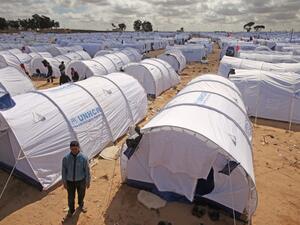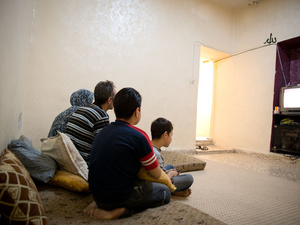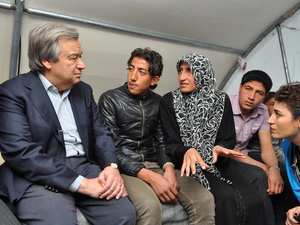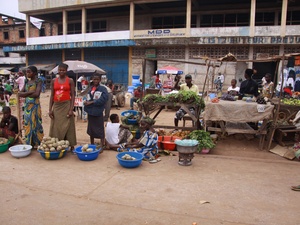You can't grow crops in asphalt: displaced Colombians struggle in the city
You can't grow crops in asphalt: displaced Colombians struggle in the city
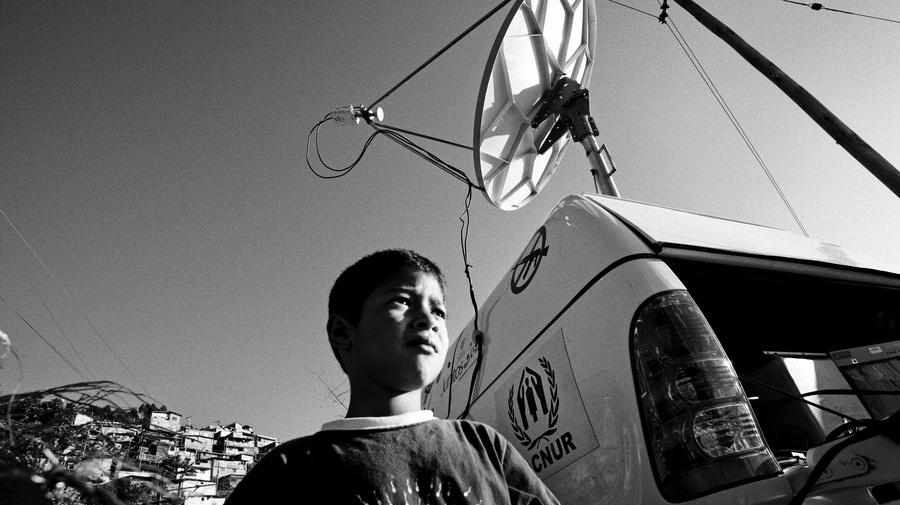
A Colombian boy stands by a UNHCR vehicle in a Medellin shanty town that his family fled to from the countryside. Rural Colombians find life in urban areas a struggle.
BOGOTA, Colombia, January 11 (UNHCR) - Luz Maria was born and grew up in the lush Colombian countryside, and she and her husband fought hard to hang on to their rural lifestyle when an illegal armed group moved into the area a decade ago.
Like many country folk before and since, they lost the struggle - and today Luz Maria and Brandon are still struggling to come to terms with life in the city, after fleeing to Medellín in north-west Colombia in 2002. About 80 per cent of Colombia's more than 3 million internally displaced people live in towns and cities.
Life was never easy in the hinterland of Antiquoia department, but it was home and Luz Maria, Brandon and their five children lived a relatively comfortable life growing fruit and vegetables and raising chickens and dairy cows.
But one day the local commander of an irregular armed group - a woman - turned up on the doorstep and demanded that they leave. It was the beginning of two years of harassment, which only ended when Luz Maria's children were directly threatened in 2002.
"We knew we would eventually have to leave our farm, but we grew up in the countryside and we loved our rural life," Luz Maria told UNHCR by telephone from Medellín. "The biggest issue for us was not knowing where to go and leaving everything we owned behind."
They headed to Medellín, capital of Antioquia, where they eventually settled in a suburban shanty town alongside more than 12,500 other people, almost all of them forcibly displaced. The settlement is a patchwork of dwellings made from branches, plastic and zinc sheets and it lacks basic services such as clean water, health clinics and electricity.
Life was hard, and it's not got much easier over the years, with a host of problems cropping up to add to the hardship. "Moving to the city has been a drastic change," Luz Maria said. "This is a concrete jungle, and you can't grow crops in asphalt."
Insecurity in the neighbourhood is also an issue that bothers Luz Maria. "Although we're no longer near illegal armed groups, it doesn't mean we can feel safe here," she said, adding: "I won't leave my house alone for a second or we'd get robbed. My children can't run around freely, like they did in our farm. There is drug abuse among teenagers . . . and I am afraid my kids will get mugged or worse . . . just last week a little girl was murdered."
But she's most concerned about the safety of her 21-year-old daughter, Sara, who makes a bit of money for the family by working in a nursery and wants to become a teacher. "But the word in the barrio is she's very proud, and you know they'll do anything to have a proud girl humbled."
Meanwhile Brandon is slowly losing his eyesight and finds it increasingly difficult to find work. As a result of all this, he's often in a bad temper because he feels that he cannot provide enough for his family.
But despite all the setbacks they have suffered, Luz Maria has always tried to look on the positive side and worked hard to improve her family's situation, including taking part in a UNHCR income-generation programme aimed at helping forcibly displaced people like her to become self-sufficient. The refugee agency also works with the local authorities to promote and ease integration of the displaced into the community.
With UNHCR-funded training, Luz Maria learned hair styling skills and now runs a beauty parlour, dubbed "Style and Image," from her one-room home. "It's not really profitable," noted Luz Maria, but it's better than nothing. She also bakes solteritas, custard-filled cookies that Brandon sells in the wealthy neighbourhoods of Medellín.
She helps keep family spirits up through example. But she has given up any real hope of returning to her former life. "Our home is run down and the once fertile land is full of weeds and brushwood. We would need about 15 million pesos (US$7,000) to restore it," she revealed. "We had such a good life there . . . now we're just resigned to the life that was chosen for us here."
Cristina Villarreal in Bogota, Colombia



